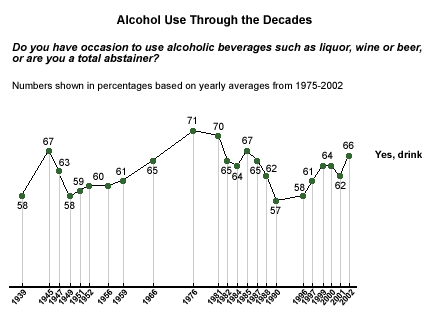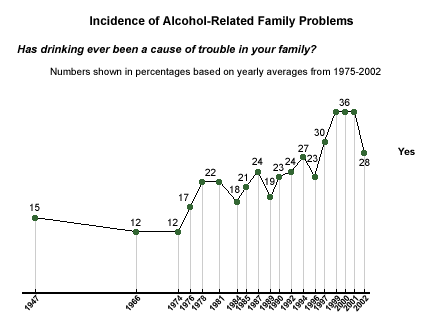Local news coverage of drunk driving accidents, domestic abuse and teen-age alcohol poisoning deaths serves as a constant reminder of the serious problems alcohol abuse creates in America. A July 2002 Gallup Poll* found that 66% of American adults consume alcoholic beverages. This percentage has been on the rise since 1996, and is also up from its 1939 level of 58%, when Gallup first began asking the question. However, alcohol consumption in the United States has varied over time. Comparatively higher levels of use occurred in 1945 and 1946 and between 1974 and 1981. But overall, Gallup data indicate that Americans have not appreciably progressed toward healthier habits when it comes to alcohol use.

Abuse of alcohol occurs when consumption negatively impacts a person's social relationships. Gallup research shows that alcohol has become an increasingly likely cause of family problems over the past five decades. In 1945, 15% of Americans reported that alcohol had been a cause of trouble in their family -- a percentage that more than doubled to 36% in 1999 and 2001. While this number declined to 28% in 2002, it remains quite alarming to consider that more than one-fourth of the population has been negatively affected by alcohol abuse. Further, the percentage of people reporting that alcohol has been a cause of trouble in their family has increased much more rapidly than the percentage who report personally consuming alcohol.

Instances of far worse consequences also remain far too common. According to the Centers for Disease Control and Prevention, in 1999 there were 19,171 non-motor vehicle-related, alcohol-induced deaths in the United States. There were 26,259 deaths from chronic liver disease and cirrhosis. The Tenth Special Report on Alcohol and Health, published in 2000 by the National Institute on Alcohol Abuse and Alcoholism (NIAAA), reported that 20% to 40% of patients in large, urban hospitals are there because of drinking-related illnesses.
What Can Be Done About Alcohol Abuse?
While alcoholism is a disease, it is a treatable and controllable condition. Improvement of alcohol-related health outcomes can be achieved by focusing on two key areas.
1. Early Diagnosis by the Primary Care Physician Through Screening
Physicians are often criticized for over-emphasizing restorative care over preventive care. In addition, many insurance plans do not cover routine screenings and preventive education. The key is to identify and treat alcohol abuse problems before patients develop chronic medical conditions or end up in the hospital with alcohol-related injuries. In 2000, the Columbia University National Center on Addiction and Substance Abuse found that 94% of primary care physicians misdiagnose or completely miss patient alcohol abuse problems. To address the issue, the American Medical Association Council on Scientific Affairs recommends routine alcohol abuse screening for all patients aged 14 and older.
2. Improve Treatment Success
The second key to success is better treatment of alcohol abuse once it has been diagnosed. Many who have experience with alcohol abuse know the frustration of a patient who bounces from program to program in the rehabilitation process. According to "Alcoholism Treatment in the United States: An Overview," a 1999 article by physician Richard K. Fuller and Susanne Hiller-Sturmhofel, PhD, that was published in Alcohol and Research Health, the vast majority of patients (65% to 80%) who enter alcohol abuse treatment programs do not remain abstinent for even a year after treatment. Inpatient, outpatient, behavioral and pharmacological treatment programs must be improved so they can achieve higher success rates.
Key Points
Gallup data indicate little progress toward reducing alcohol use in the U.S. population, as well as an increased incidence of alcohol-related family problems. Earlier diagnosis and more effective intervention models are needed to improve these problems. Those who suffer from alcoholism may often be in denial, but the healthcare system and our society must not suffer from denial of the problem.
*Results are based on telephone interviews with 1,004 national adults, aged 18 and older, conducted July 9-11, 2002. For results based on the total sample of national adults, one can say with 95% confidence that the maximum margin of sampling error is ±3%.